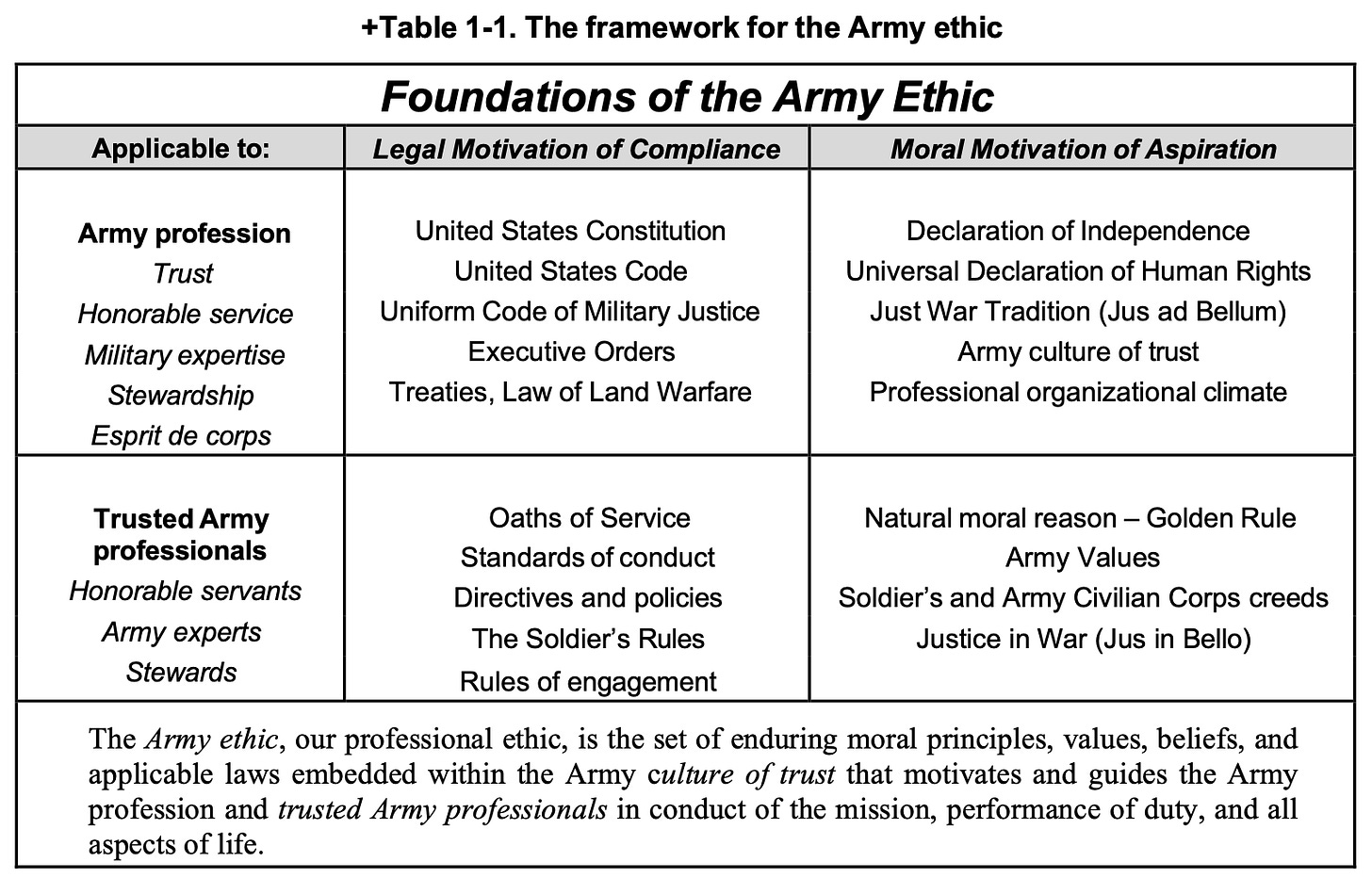Just Following Orders
Study.

Are your ethics evident?
Borrow One Idea: Compliance versus Aspiration
As the marshal shouted “Let justice be done,” Peter von Hagenbach was beheaded in 1474, after being tried and convicted by the first international criminal tribunal. Created by the Archduke of Austria, the tribunal consisted of 28 judges from different states in the Holy Roman Empire. Von Hagenbach, appointed governor by Charles the Bold, Duke of Burgundy, was told to keep order in Austria’s territories on the upper Rhine. In fulfilling the duke’s directive, von Hagenbach terrorized the population.
Charged with violation of “the laws of God and man,” specifically murder, rape and perjury, among other crimes, von Hagenbach used as his defense that he was simply following orders. “Is it not known that soldiers owe absolute obedience to their superiors?” he asked.
Five hundred years later, the rule for leaders (and those who wield power in any form) is still the same: being ordered to do something is not a justification to abdicate one’s own ethical standards and violate another’s rights.
1-16. Army professionals protect the constitutional rights of every American and the basic human rights of all people. Any failure to respect these rights diminishes trust with the American people and with the international community. Such failure can cause great harm to the legitimacy of the Army profession and the Nation. Important insights for all Army professionals informing why and how they serve include—
The collective rights of the American people to independence and political sovereignty constitute the moral basis for the Army mission.
Protecting the Nation’s collective rights is the honorable service the Army profession provides for society.
Army professionals must not violate the rights of others, or they violate their own ethic and erode the trust and legitimacy built with the American people, allies, and partners.
ADP 6-22, 1-16, PDF page 19
If it is not enough to say ‘I just follow orders’, it is also not enough to do things without reasoning. ‘I felt like it’ is not a good answer either. Ethical frameworks are required.
This week’s Guided Discovery will cover the totality of the Army Ethic, but today, focus on the foundations:
Consider the Army’s delineation between and pairing of legal and moral motivations. Following orders is a part of the Army profession, but it does not exist in a vacuum. For every ‘what’ in an order there is a ‘why’.
Kids love to ask ‘why’. They lack foundations. Asking ‘why’ helps build them.
Businesspeople are taught to ask ‘five whys’. To look for root cause…foundational issues.
In both cases, the answer ‘because I said so’ is deemed wholly insufficient. Children will not tolerate this non-answer and in business there are four more ‘whys’ specifically to push past the legal compliance layers and find something deeper.
What is deeper is moral aspiration. Legal motivations are durable and important, but they are still contextual and subject to change.
Moral motivations transcend most situational context. They get to the deeper ‘why’. They are what is beyond following orders.
A strong ethical foundation, balanced between motivations of legal compliance and moral aspiration, provides an enduring ‘why’ for team members.
This week, borrow with pride and evaluate the legal and moral motivations in your life. What is based on compliance? What is based on aspiration? Ask yourself ‘why’? Consider your organization’s ethical foundation and your own. What do you demonstrate as a leader? Are your ethics evident?
Get Familiar With: The Profession and Ethic
The world needs people who volunteer. We rely on them.
For more than 240 years, the United States Army has protected the people and interests of the Nation. The Army is not alone. The Marines Corps, Navy, Air Force, Coast Guard, government agencies, and local law enforcement and firefighters all perform similar services to the Nation and its communities. All volunteered. In many cases, they choose to place themselves in harm’s way based on a conviction that personal service makes a difference.
ADP 6-22, Chapter 1, Introductory Paragraph, PDF page 17
The act of volunteering is celebrated (and should be), but that single act does not endow the volunteer with expert capabilities or infallible judgement. Raising your hand is not the last step, it is the first step.
1-1. Enduring the physical hardship, danger, and uncertainty of combat requires an Army that is professionally committed and guided by an ethic that motivates and guides its forces in the conduct of missions, performance of duty, and all aspects of life.
1-2. Providing the purpose, direction, and motivation required to inspire others to risk their lives to accomplish missions requires leaders committed to their profession and ethic. To prepare Army leaders to fulfill their responsibilities, the Army profession develops Soldiers and Army civilians who demonstrate character, competence, and commitment…
ADP 6-22, 1-1 through 1-2, PDF page 17
Leaders and managers are also volunteers. No one is required to continue to move up in an organization. You do not ‘need’ to be in charge of anything. It is always an accepted choice.
Volunteers, leaders, managers, and all those who serve and exercise authority in any capacity, must be held to the highest of ethical and professional standards. They must because we are relying upon them.
Are your ethics evident? What does it mean to be committed to your profession and ethic? How does an organization (or individual) develop character, competence, and commitment? What are your ethical foundations?
The Guided Discovery for this week will examine the US Army’s definitions for professional, ethical leadership, what is expected of uniformed and civilian leaders, and the beliefs and behaviors required to effectively lead.
Learn More: Suggested Reading
ADP 6-22, Army Leadership and the Profession
Pages 1-1 through 1-14 based on printed document (PDF pages 17-30)
Discussion of the Army profession, ethic and expectations of a professional, ethical leader
These materials will be the focus of Thursday’s Guided Discovery
Catch Up: Last Week’s Content
Study: Take Notes
Guided Discovery: Battle Rhythm
Always be asking:
1. What is the connection with my leadership development?
2. How does this change my thinking on management?
3. How does this influence planning for life?
4. What can I borrow with pride to use this week?

